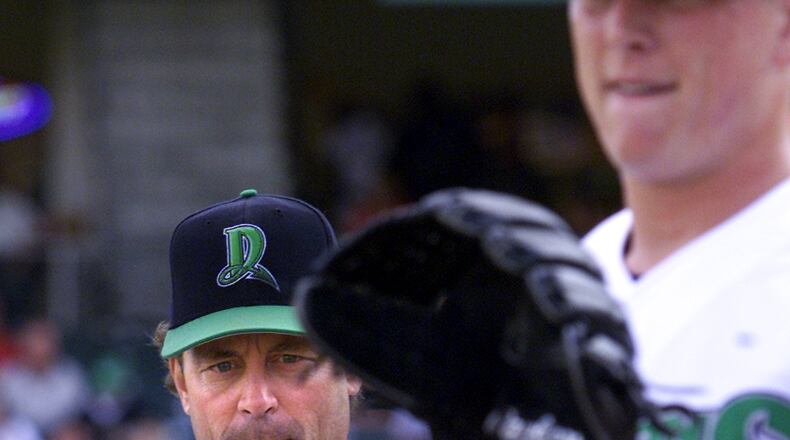What Cash did caused baseball aficionados across the country to act as if Cash was re-inventing the wheel, complete with spokes and tires.
As the discussion wore on, Power finally folded his arms and said, “Been there, done that.”
And he certainly did and it was in a high pressure-cooker playoff scenario. Power, a former Reds pitcher and now the assistant pitching coach, was pitched in relief all season for the Pittsburgh Pirates in 1990.
But in Game 6 of the National League Championship Series against the Reds, an elimination game, Pittsburgh manager Jim Leyland handed him the ball and said, “You’re starting.”
Power said Leyland never told him why but later some of the coaches said Leyland hoped Reds manager Lou Piniella would change his batting order around.
It was left-hander Zane Smith’s turn to start for the Pirates and the Reds had only one left-handed batter in the order, Paul O’Neill. So Leyland started the right-handed Power.
“It almost worked,” said Power. “I gave up one earned run and we lost, 2-1.”
Power pitched 2 1/3 innings and gave up one run and three hits before Zane Smith took over. Didn’t matter. Cincinnati’s Danny Jackson, Norm Charlton and Randy Myers held the Pirates to one hit and clinched the series before sweeping Oakland four straight in the World Series.
Cash’s idea of starting the right-handed Romo was along the same lines as Leyland’s methodology. The first three hitters in the Angels lineup were right handers and the scheduled Rays pitcher was left-handed Ryan Yarbrough. Romo started the first inning and struck out the side, then Yarbrough took over for the second.
Would this work for the Cincinnati Reds? Don’t the Reds’ starters give up an inordinate amount of first-inning runs? Yes, they do.
Reds relief pitchers David Hernandez, Jared Hughes and Austin Brice are all-in on the idea of one of them starting a game and then turning it over to a starter after one or two innings.
Hernandez was especially intrigued and said, “I used to be a starter. Mention that to the skipper (manager Jim Riggleman).”
Hernandez likes it for two reasons, at least.
“Yeah, I wouldn’t mind,” he said. “I’d get my work done early. It would eliminate a lot of anxiety for me of hanging around in the bullpen, waiting around until your name is called. I think it would be pretty cool.”
When it was mentioned that the Reds starters are notorious first-inning run bleeders, Hernandez said, “That’s been one of our problems this season. It is intriguing. It gets the starter more relaxed and he can face the bottom of the order when he comes in. That would help. It would take a lot of pressure off some of young starters by letting them start against the other team’s lower part of the batting order.”
Jared Hughes has made 403 major league appearances, all out of the bullpen. When presented the idea of a relief pitcher starting a game he said, “Oh, yes. My first major league start. How cool would that be? I’m always looking to get my first major league start.
“I’m very comfortable in the bullpen and I’m always game to pitch whenever and wherever the manager wants me to pitch,” said Hughes. “That could be the first inning, that could be the ninth inning, that could be the 15th inning. When I’m needed to pitch, that’s when I'll pitch."
Then he paused to contemplate the concept of starting a relief pitcher for one or two innings.
“With that said, I think it’s interesting,” he said. “Maybe it becomes a thing. And if it does, it might change the game a little bit. I don’t know the number, but I’ve heard the team the scores first wins the majority of the time. So if it is a way to keep the other team from scoring first, why not try it?”
Austin Brice sees if from a different perspective.
“I feel the way the game is going, the way they protect some of the starters, doing that is not something out of the question,” he said. “It is very rare, except for your elite guys, that they go seven, eight or nine innings any more.
“That wouldn’t be a bad thing to have a couple of relievers go two or three innings and then have the starter finish the game, if he can,” Brice added. “That’s an efficient system. That’s a quick change of pace for the hitters to face, too.”
Manager Jim Riggleman was an astute observer of Cash’s usage of a relief pitcher as a quick starter.
“You know what I found interesting?” he said. “I totally understand why he did it. The Angels put three right-handed hitters up there right away. Romo is tough on righties (he struck out the side, including Mike Trout).
“It was a good idea and how your players handle it is very important,” Riggleman added.
Riggleman smiled broadly and invoked the name of Roger Clemens, one of baseball’s uber competitors.
“If you said to Roger Clemens, ‘We’re going to start Romo today and bring you in later,’ you know, Romo might be found hanging in the bathroom and Clemens would tell his manager, ‘No, Romo is not going to start today’s game.’”
Riggleman added, “If it fits with the whole mix of your club (no super star pitchers like Justin Verlander or Clayton Kershaw or Chris Sale or Max Scherzer) then it is another one of those theories going around that might work.”
QUOTE OF THE DAY
From Jared Hughes, when somebody mentioned his nickname should be ‘6-4-3’ because of his propensity for inducing ground balls with his diving sinker: “Hey, I like that. It’s better than ‘The Ostrich,’ a name somebody came up for me because of the way I run in from the bullpen, or ‘The Spaghetti Man’ for the way I try to pick guys off second base.”
About the Author
